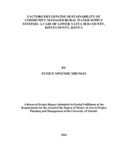| dc.description.abstract | Water is a right to human beings. It has been a concern to the whole world to provide all people with adequate and safe water. International, national government, NGOs, private sectors and religious sectors have earnestly supported water projects with large sums of money. Irrespective of the efforts made, water has remained a bigger challenge to the whole world. More than a billion people in developing World are vulnerable to access a reliable source of water. The world countries have purposed in halving the proportion without access to safe water. The aspect of sustainability of the water projects has been a challenge. Community members have been so ignorant to participate in water supply systems and keep it working after the external help is stopped. The purpose of this study was to investigate the factors influencing sustainability of community managed rural water supply system in Lower-Yatta Sub-County so that appropriate measurements could be recommended for the sustainability. The study objectives were guided by four potential factors selected covering institutional management, financial influence, technological factors and stakeholder participation. The study used descriptive survey research design. The targeted population was 500 respondents. The data was collected using questionnaires were administered to 35 respondents which were in closed form and interview was administered to individuals. It was studied in terms of: type of management, Role of management structure, training of management group, capacity building among the management committee group and the number of members in the management committee. Management committee was represented by CBO was stated by 2 (5.7%), Private individual was stated by 8(22.9%), Religious group 9(25.7%), NGO 6(17.1%), Management committee and Government agency 3(8.6%). This indicates that for the sustainability of water supply systems to be achieved, there must be management committee that manages water supply systems. The study recommends that, training of community members concerning the community managed rural water supply systems should stabilize the sustainability of water and also the national and the county government should develop policy documents, strategy guidelines, and standards that can be beneficial in dealing with problems that influence community from accessing adequate and clean water. | en_US |



